The infuriating thing many good workers learn is that efficiency just means a manager will pile on more tasks. One goes from an eager go-getter to a more calculating clever worker. Until management learns to actually reward ability they will only end up getting as much utility as they are willing to pay for. A particularly fast worker learned the hard way that management hates downtime with a passion. She was told to cut down on her downtime so she did exactly as asked. We also reached out to Luna Wolf to hear her insights on the event and how she manages her new workload. Even if you know better sometimes you just have to do what your boss tells you to Image credits: Vlada Karpovich (not the actual photo) One particularly effective worker ended up being told to reduce her downtime so she complied Image credits: nd3000 (not the actual photo) Image source: LunaWolf92 Some workplaces have way too many unnecessary tasks piled on workers Image credits: Mizuno K (not the actual photo) Bored Panda reached out to Luna Wolf to learn a bit more about her experience and she was kind enough to get back to us. First we wanted to know how her less downtime strategy affected what she does in the time she now has. Now during my free time I set a stopwatch to measure how long Im spending in downtime and entertain myself during that time. At the end of the day I add whatever the stopwatch says to my data as office work. We were curious to learn what in her opinion caused some managers to just give downright counterproductive suggestions. I think some managers just cant see the big picture. Yes I might have more downtime but I see more patients because of my efficiency. Someone else might have less downtime but see fewer patients. Luna Wolf has one other story she wanted to share: Id like to add this ridiculous request for you to include: when we were all still working at the hospital before covid there were sometimes very slow days. If my manager came into the office and saw any of us chatting or being on the phone or otherwise not working he would ask us to do rounding. This meant going to each of the nurse stations (about 10 per floor) in each of the hospitals 6 main floors 2 pediatric floors and 4 specialty floors and asking if anyone needs an interpreter. Not only was this a huge waste of time many of the nurses were confused because they hadnt called for an interpreter (because they didnt need one!) and we would end up missing calls and videos because we were out in the hospital doing that instead. Managers have an irrational fear of downtime Image credits: Sora Shimazaki (not the actual photo) Unfortunately Luna Wolf isnt alone as many a worker can attest to being drowned in busywork as soon as a manager smells downtime. Veteran workers instead of using all their hard-earned skills and expertise instead find ways to mask their abilities. The story above is one such example but at least OP was in a fortunate situation where she found something productive to do with the time. There are horror stories out there of effective workers completing tasks ahead of time and then languishing in an office doing nothing. This somewhat resembles being sent to solitary confinement in prison but most workers might still find it preferable to extra generally unpaid work. Some research indicates that a lot of office workers dont even spend half of their time working. Many managers fear creating an image of relaxation so they are driven by a compulsion to fill workers time with generally unimportant tasks. Some research indicates that about 40% of busy work could be done later or delegated but the appearance of productivity ends up winning. In the long run this creates nonsensical incentives and results in the story given above where productivity is actually negatively influenced by decision-makers. OP gave some more context to curious readers Others thought management as usual was blind Some shared similar stories of finding things to do when bosses had nonsensical orders The post Apparently This Isnt Good Enough: An Efficient Worker Is Effectively Told To Do Her Tasks Slower So She Complies first appeared on Bored Panda. Apparently This Isnt Good Enough: An Efficient Worker Is Effectively Told To Do Her Tasks Slower So She Complies
The infuriating thing many good workers learn is that efficiency just means a manager will pile on more tasks. One goes from an eager go-getter to a more calculating, clever worker. Until management learns to actually reward ability, they will only end up getting as much utility as they are willing to pay for.
A particularly fast worker learned the hard way that management hates downtime with a passion. She was told to cut down on her downtime so she did exactly as asked. We also reached out to Luna Wolf to hear her insights on the event and how she manages her “new” workload.
Even if you know better, sometimes you just have to do what your boss tells you to

Image credits: Vlada Karpovich (not the actual photo)
One particularly effective worker ended up being told to reduce her downtime, so she complied
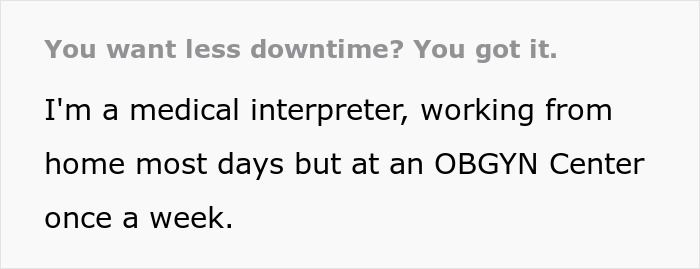
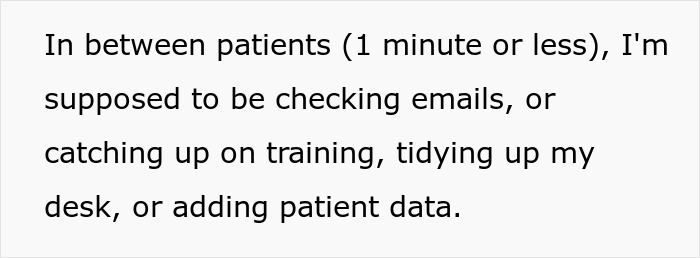

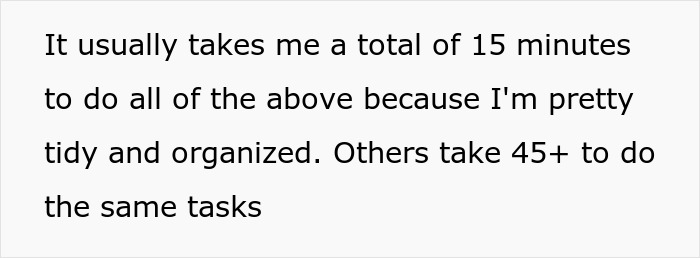
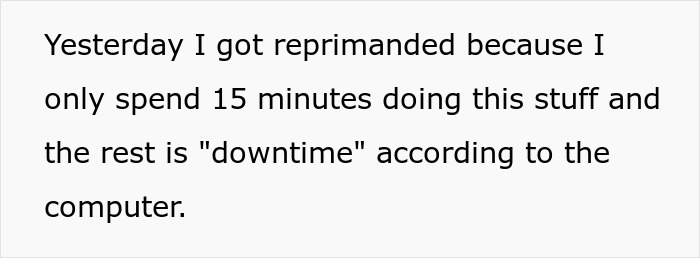

Image credits: nd3000 (not the actual photo)
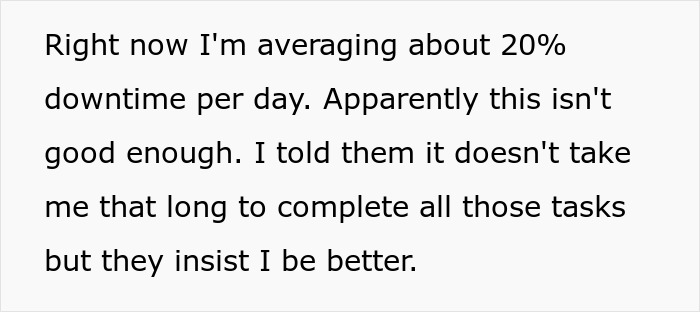
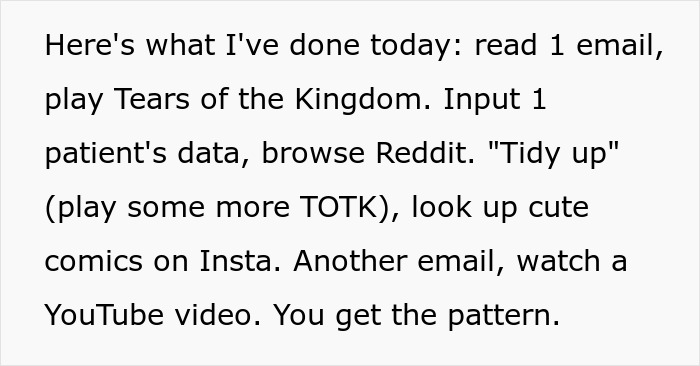

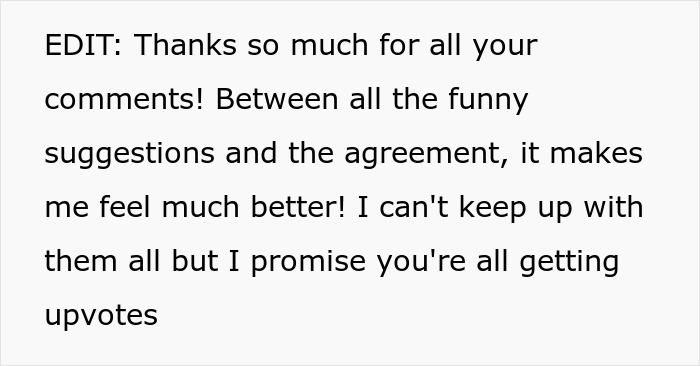
Image source: LunaWolf92
Some workplaces have way too many unnecessary tasks piled on workers

Image credits: Mizuno K (not the actual photo)
Bored Panda reached out to Luna Wolf to learn a bit more about her experience and she was kind enough to get back to us. First, we wanted to know how her “less downtime” strategy affected what she does in the time she now has. “Now during my free time, I set a stopwatch to measure how long I’m spending in “downtime” and entertain myself during that time. At the end of the day, I add whatever the stopwatch says to my data as “office work.” We were curious to learn what in her opinion caused some managers to just give downright counterproductive suggestions. “I think some managers just can’t see the big picture. Yes, I might have more downtime, but I see more patients because of my efficiency. Someone else might have less downtime but see fewer patients.”
Luna Wolf has one other story she wanted to share: “I’d like to add this ridiculous request for you to include: when we were all still working at the hospital before covid, there were sometimes very slow days. If my manager came into the office and saw any of us chatting or being on the phone or otherwise not working, he would ask us to do “rounding”. This meant going to each of the nurse stations (about 10 per floor) in each of the hospital’s 6 main floors, 2 pediatric floors, and 4 specialty floors, and asking if anyone needs an interpreter. Not only was this a huge waste of time, many of the nurses were confused because they hadn’t called for an interpreter (because they didn’t need one!) and we would end up missing calls and videos because we were out in the hospital doing that instead.”
Managers have an irrational fear of downtime

Image credits: Sora Shimazaki (not the actual photo)
Unfortunately, Luna Wolf isn’t alone, as many a worker can attest to being drowned in “busywork” as soon as a manager smells “downtime.” Veteran workers, instead of using all their hard-earned skills and expertise instead find ways to mask their abilities. The story above is one such example, but at least OP was in a fortunate situation where she found something productive to do with the time. There are horror stories out there of effective workers completing tasks ahead of time and then languishing in an office doing nothing. This somewhat resembles being sent to solitary confinement in prison, but most workers might still find it preferable to extra, generally unpaid work. Some research indicates that a lot of office workers don’t even spend half of their time working.
Many managers fear creating an image of relaxation, so they are driven by a compulsion to fill workers’ time with generally unimportant tasks. Some research indicates that about 40% of busy work could be done later or delegated, but the appearance of productivity ends up “winning.” In the long run, this creates nonsensical incentives and results in the story given above, where productivity is actually negatively influenced by decision-makers.
OP gave some more context to curious readers
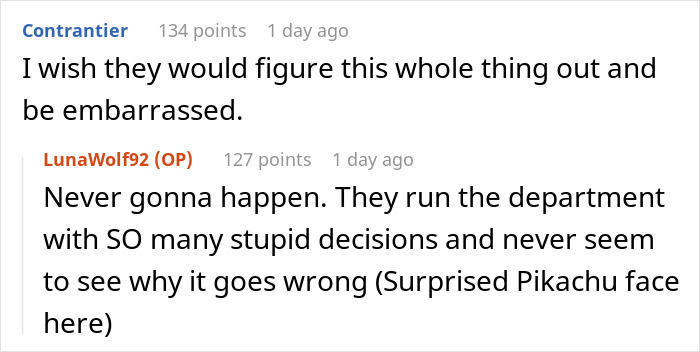
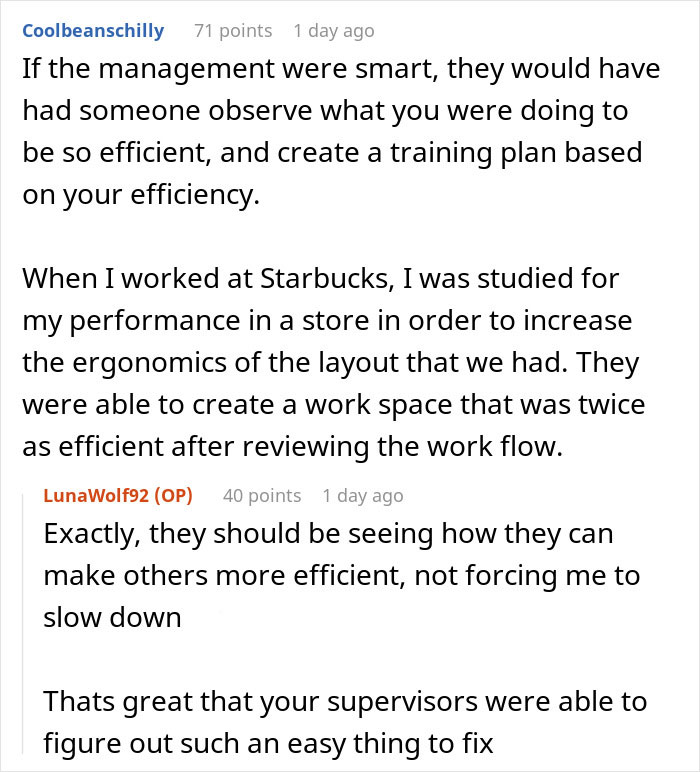
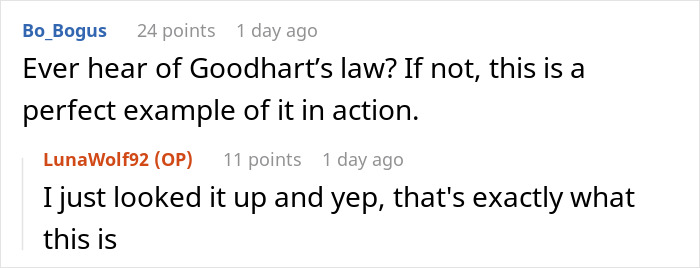
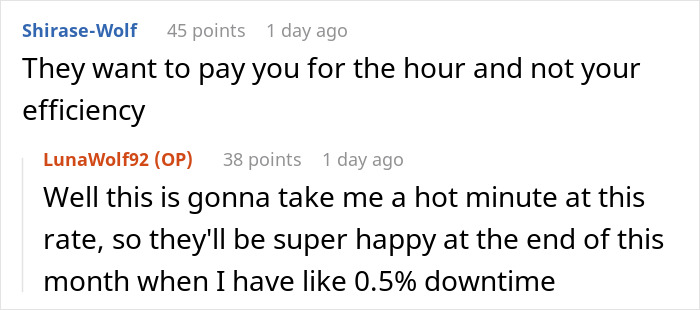
Others thought management, as usual, was blind
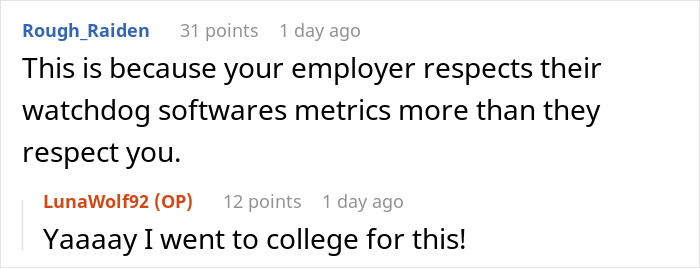

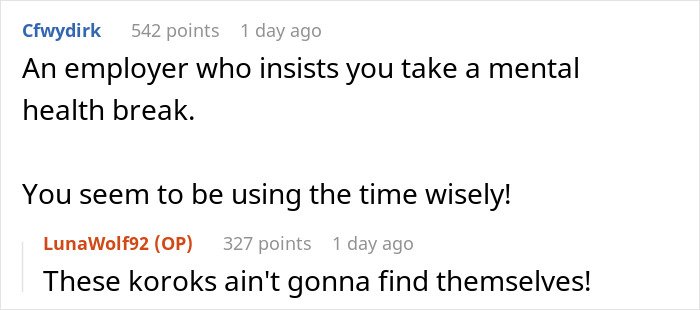
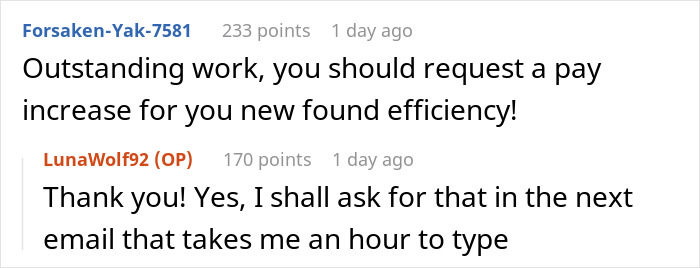
Some shared similar stories of finding things to do when bosses had nonsensical orders
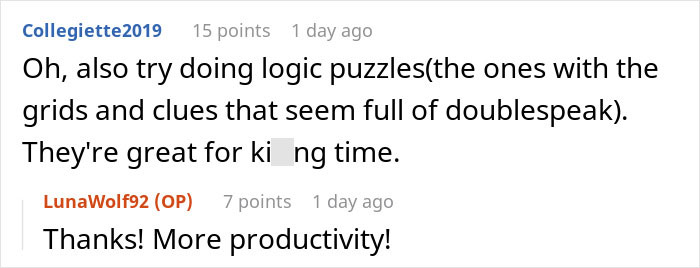

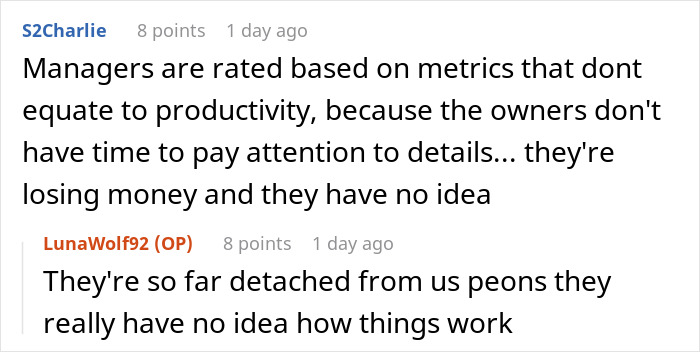
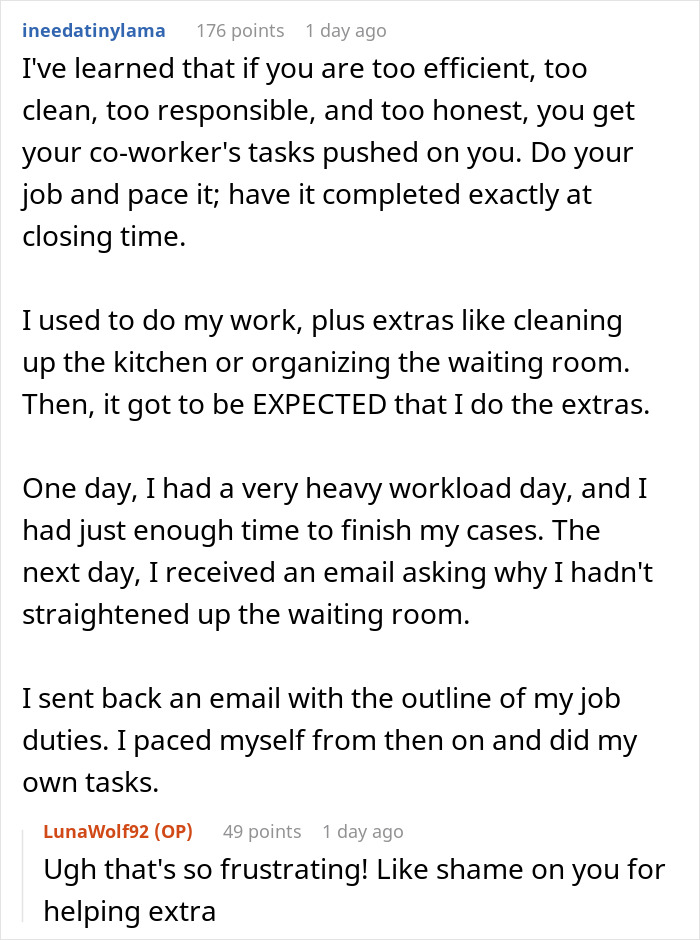
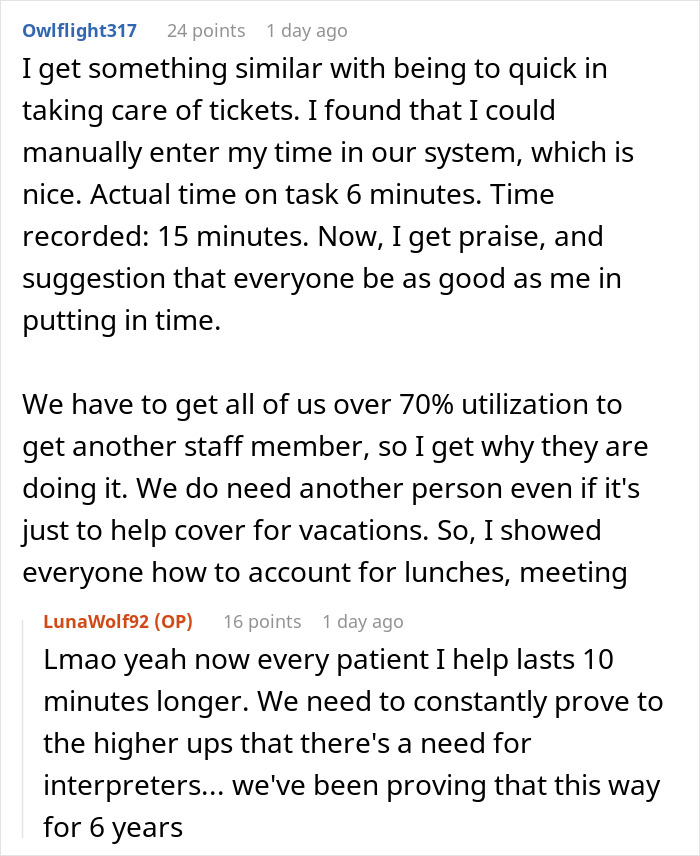
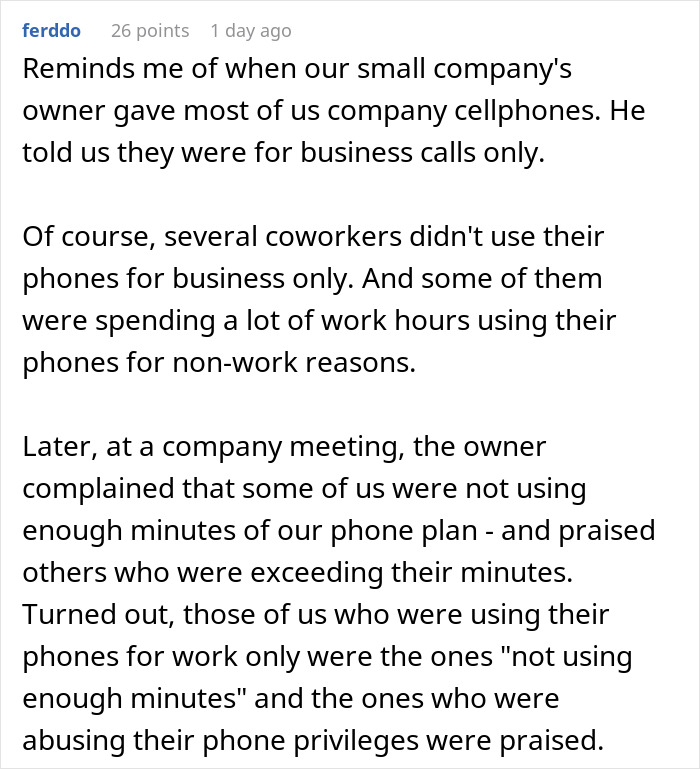
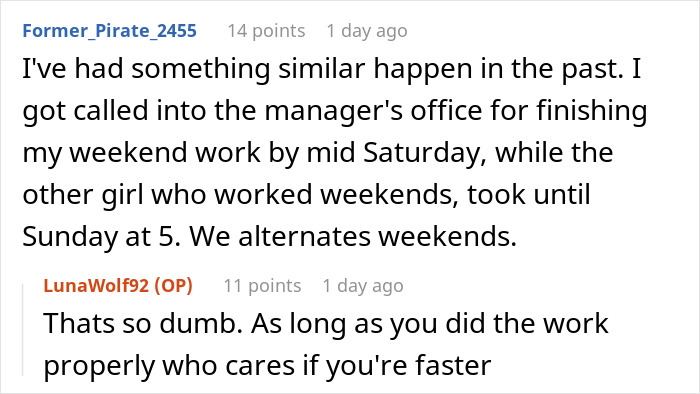
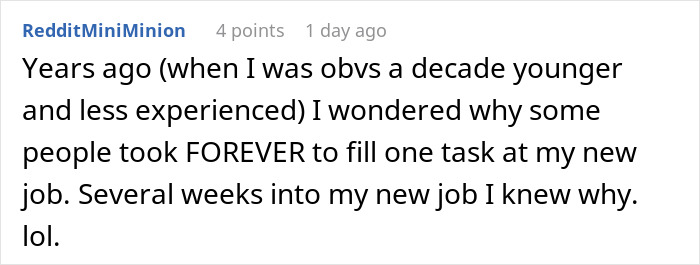

The post “Apparently This Isn’t Good Enough”: An Efficient Worker Is Effectively Told To Do Her Tasks Slower, So She Complies first appeared on Bored Panda.
from Bored Panda https://ift.tt/XIpghO9




No comments: